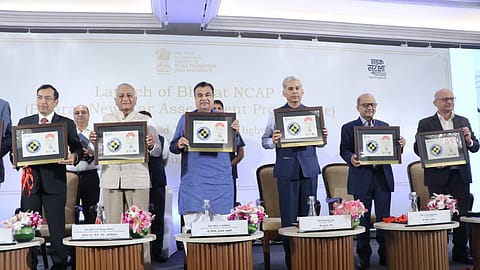Govt launches Bharat NCAP; gets requests to test 30 car models
Bharat NCAP has already received requests to test 30 models from automakers ahead of its launch, says Nitin Gadkari.

Union Minister of Road Transport and Highways Nitin Gadkari launched the Bharat New Car Assessment Programme (Bharat NCAP) today in New Delhi in an effort to enhance vehicle safety standards for up to 3.5-tonne vehicles in India.
Bharat NCAP has already received requests to test 30 models from automakers ahead of its launch, says Gadkari.
"This is a landmark step towards empowering our consumers to be able to make a better choice for buying safer cars," the Union minister says.
Bharat NCAP will also greatly push the safety and quality of the vehicles in India, while simultaneously promoting a healthy competition among OEMs (original equipment manufacturers) to manufacture safer vehicles, says Gadkari.
"The new safety regime under Bharat NCAP and AIS-197 is a mutual win-win for manufacturers and consumers and an instrumental step towards safeguarding lives of our citizens and making our Automobile Industry the number one auto manufacturing hub in the world," says Gadkari.
Bharat NCAP is a voluntary programme in which the base variants of a given model will be tested. It is applicable to approved motor vehicles of M1 category.
This car testing programme will commence on October 1, 2023 and will be based on Automotive Industry Standard (AIS) 197.
Recommended Stories
The programme aims to create an ecosystem of competitive safety enhancements leading to increased awareness among consumers. Consumers can take an informed decision by making a comparative assessment on vehicle performance under crash test conditions.
The Bharat NCAP programme will be anchored by Central Institute of Road Transport (CIRT).
"Maruti Suzuki welcomes this initiative of the government and will offer at least 3 models for BNCAP testing in the first lot itself," says Rahul Bharti, executive officer, Corporate Affairs, Maruti Suzuki.
"Any car that is launched in India follows the mandatory safety standards set by the government. For consumers seeking extra safety information the Bharat NCAP system is an authentic and objective rating system to empower the customer to make an informed choice," Bharti adds.
(INR CR)
The Bharat NCAP programme will assess cars based on five parameters, including structural safety, the safety of adult occupants of the car, the safety of child occupants, the assessment of the car for pedestrian-friendly design, and the provision of active and passive safety assist technologies. The proposed assessment will allocate a star rating from 1 to 5 stars.
"BNCAP is an enhanced road safety movement that extends much beyond just safety ratings for cars. We wholeheartedly commend and will comply with the Government of India for its visionary approach to safety, encompassing both active and passive safety components. Aligned with the Atmanirbhar Vision of the Government of India, this move eliminates the need and associated costs of testing vehicles outside. It will also elevate the global reputation of products from India to the world with good ratings in a big way," says Myung-Sik Sohn, chief sales and business officer, Kia India.
According to Vinod Aggarwal, president, SIAM, the safety star rating of new passenger vehicles will go a long way in educating customers in making informed purchase decisions, which would now be very strongly influenced by the safety parameters of the vehicle. "A standardised evaluation method will also help customers compare safety rating of different cars and help them choose an appropriate model," Aggarwal adds.
The Centre last year extended the deadline for mandatory implementation of six airbags in a passenger car by a year to October 01, 2023. A minimum of six airbags mandatory for cars is expected to enhance the safety of passengers. India sees around 5 lakh accidents every year, resulting in 1.5 lakh deaths, costing over 3% to India's GDP, Gadkari says, adding that 60% of such deaths are in the age group of 18-34 years.